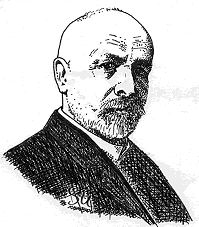How God created the world using the inconsistency of arithmetic

Throughout history, clever critics
have complained that if theologians try to bring in God's
creative powers to explain why there is something in the
universe rather than nothing, they are just trading one
mystery for another with no net gain in understanding. In
short, the critics complained that the theological
explanation for why the universe isn't empty is too short on
details. To prove those critics wrong, the mathematician
Grandi provided the following mathematical derivation in
1703 to show the details by which God may have done it. The
main idea is that the way God created something from
nothing is analogous to the way a mathematician can create 1
from 0. Here is how a mathematician can create 1 from 0:
Start with zero, then prove it is equal to one, using these legitimate steps:
0 = 0
because of the law of identity
0 = 0 + 0 + 0 + ...
because adding a zero changes nothing
0 = (1 - 1) + (1 - 1) + (1 - 1) + ...
because each 0 equals 1 - 1
0 = 1 + (-1) + 1 + (-1) + 1 + (-1) + 1 + (-1) + 1 +...
because subtracting one is equivalent to adding negative one
0 = 1 + (-1 + 1) + (-1 + 1) + ...
because (-1) + 1 equals (-1 + 1)
0 = 1 + 0 + 0 + ...
because (-1 + 1) equals 0
0 = 1
because adding zero changes nothing.
In a recent e-mail, the Devil pointed out that this derivation works just as well, or badly, with the number 666 replacing 1.
Some mathematicians have responded to this creative use of infinite series by redefining the rules by which the terms in a series may be rearranged. Was this a hatchet job?

The deeper question in the philosophy of mathematics is whether it is really OK to change the rules of mathematics when you don't like what the old rules produce. I believe it is, provided the change preserves coherence across the various areas of mathematics, improves fruitfulness or usefulness, and minimizes the mutilitation. That's just the sort of tinkering that goes on when re-working the foundations of any discipline. For example, tinkering with some of the principles of mathematics and physics was the key to finally solving Zeno's paradoxes in the early 20th century after 2,300 years of only partial success. The way out of Zeno's paradoxes required revising the concepts of a continuum, the sum of a series, measure, duration, distance, instantaneous speed, etc. The relevant revisions were made by Newton, Leibniz, Cauchy, Weierstrass, Dedekind, Cantor, and Lebesque.

The most important move philosophically was to quit relying so heavily upon intuition and instead to let mathematical "discovery" be guided by the preservation of consistency and the usefuless for science of the resultant mathematical system.